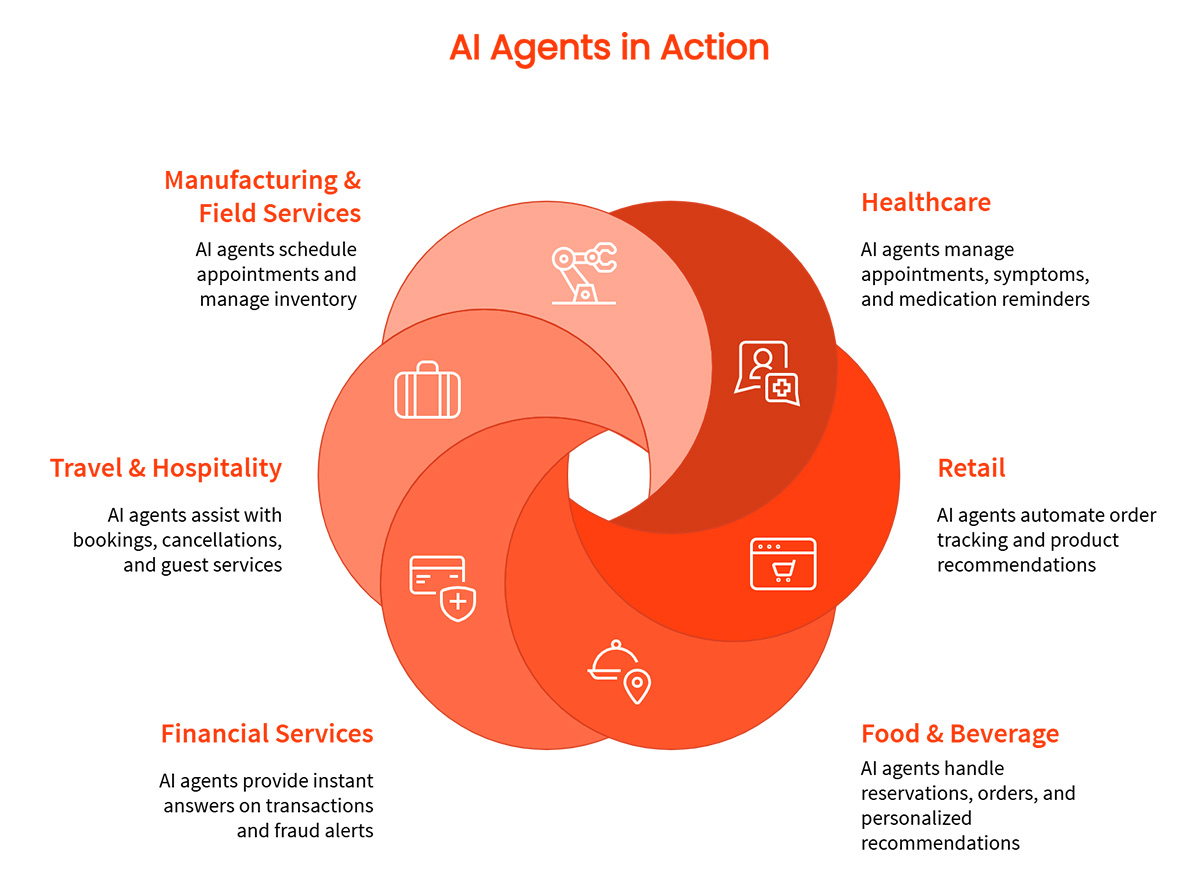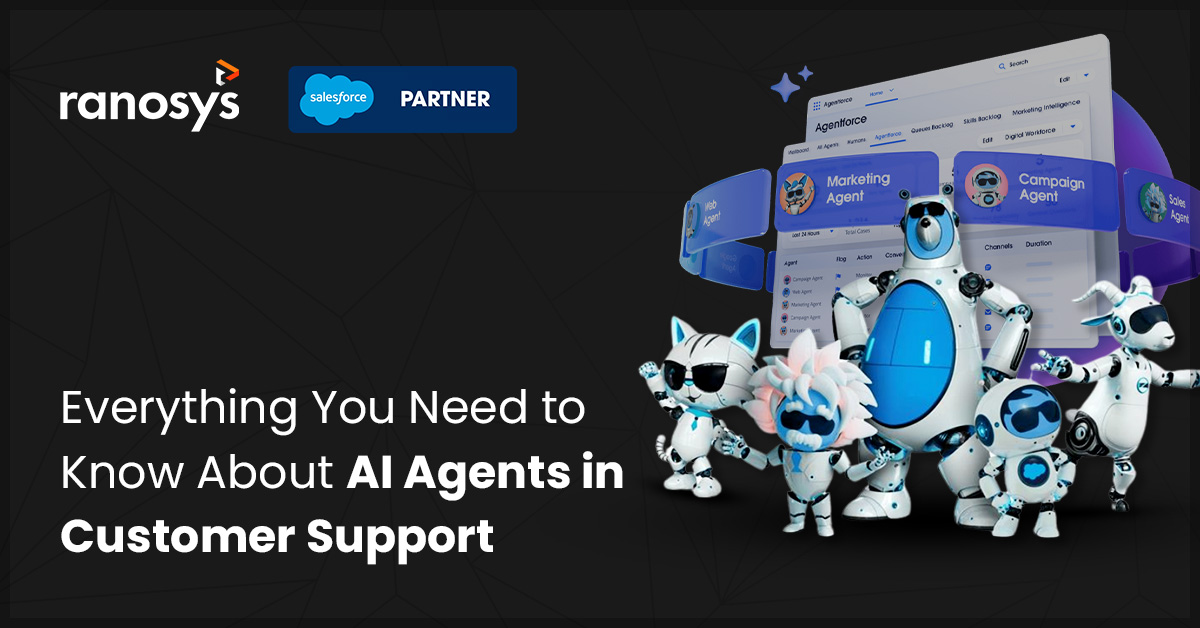Talk to our experts
Customer support has evolved dramatically over the past few years, and if you’re still relying solely on traditional methods, you’re missing out on the powerful advantages of AI Agents for customer support. Your customers expect faster responses, 24/7 availability, and personalized experiences, all while your team juggles increasing ticket volumes and complex queries. That’s where AI agents for customer support come into play, particularly Salesforce’s revolutionary Agentforce platform.
Unlike basic chatbots that follow rigid scripts, modern AI customer support agents powered by Agentforce can understand context, handle complex workflows, and deliver genuinely helpful solutions. Gartner research indicates that 80% of customer service organizations will start using generative AI technologies to boost operational efficiency and improve customer experiences by 2025.
So, how do these AI customer support agents actually work? More importantly, how can you master how to use AI agents for customer support effectively to transform your support operations? Let’s break it down.
What Are AI Agents?
Think of AI agents as your most knowledgeable customer service representative who never sleeps, never gets frustrated, and has instant access to your entire knowledge base. These intelligent systems use natural language processing (NLP) and machine learning (ML) to understand customer intent, provide accurate responses, and take autonomous actions within predefined guardrails.
That’s where Salesforce Agentforce comes into the picture. Its ability to let organizations build, customize, and scale AI agents for virtually any role, service area, or industry, all through a low-code, user-friendly experience.
What Is Agentforce?
Agentforce is Salesforce’s comprehensive platform for developing AI agents across multiple industries and service sectors. It’s not just another chatbot; it’s a comprehensive platform that can handle everything from simple FAQ responses to complex multi-step workflows like processing refunds, updating billing information, and managing technical troubleshooting.
The recently launched version of Agentforce, Agentforce 3, has completely changed the game. This latest version introduces groundbreaking features that make it the first AI agent platform built to manage and scale hybrid workforces at the enterprise level. Here’s what makes it special:
- An improved Atlas Reasoning Engine that delivers responses twice as fast as previous iterations
- Real-time response streaming that allows customers to view answers instantly
- Web search capabilities that go beyond internal data sources
- Expanded global footprint serving Canada, the UK, India, Japan, and Brazil
- Multilingual capabilities covering six additional languages: French, Italian, German, Spanish, Japanese, and Portuguese.
What really sets Agentforce 3 apart is its Model Context Protocol (MCP), which allows agents to collaborate intelligently across different systems and products. This means your customer service agents can work seamlessly with sales, marketing, and operations teams to provide truly personalized and instant support.
Key Features and Benefits of AI agents for customer support
Understanding the core Salesforce Agentforce capabilities showcases how AI agents improve customer service while driving significant business value.
- Advanced Natural Language Processing (NLP): Unlike traditional chatbots, AI-powered customer services use sophisticated NLP to grasp context, sentiment, and intent. This allows them to engage in smooth, multi-turn conversations and resolve complex queries, enhancing customer satisfaction and reducing repeat contacts.
- Autonomous Workflow Execution: AI agents for customer support can independently handle end-to-end tasks, such as processing returns or updating customer records. This automation cuts down manual effort, accelerates resolution times, and reduces operational costs.
- Seamless Human Handoff: When conversations need a personal touch, AI agents intelligently escalate cases to human agents with full context passed along. This ensures continuity in service and avoids customer frustration.
- Omnichannel Support: AI customer support agents operate across chat, voice, email, and social media channels, providing consistent and convenient support wherever customers reach out. This broad availability increases customer engagement and loyalty.
- Real-Time Assistance for Human Agents: Real-time support with AI agents helps human agents by suggesting relevant solutions and providing instant information during calls or chats, boosting agent productivity and lowering average handling times by up to 35%.
- Personalization at Scale: By leveraging customer data and interaction history, AI agents for customer support deliver tailored responses and recommendations, driving higher conversion rates and improved customer experiences.
- Predictive Analytics and Proactive Support: AI analyzes patterns to predict issues before they occur and suggests proactive interventions, helping reduce escalations and improve overall service quality.
These features not only make support faster but reshape how organizations can improve customer support with AI agents, cutting costs, increasing scalability, and elevating customer and employee satisfaction.
Use Cases of AI Agents Across Industries
Here are some real-life examples of AI agents in customer service, and discover exactly how to use AI agents for customer support to elevate customer satisfaction and streamline your operations :

Healthcare Industry
- AI customer support agents handle patient appointment bookings, reminders, and billing questions, ensuring fast, 24/7 support.
- They can scan symptoms, guide patients to the right departments, and escalate emergencies, reducing wait times and freeing staff for critical care.
- Virtual assistants can send personalized medication reminders, manage administrative documentation, and answer FAQs.
- Real-world impact? Health networks like OSF Healthcare saved $1.2M annually by diverting routine queries from call centers to AI assistants.
Retail Industry
- AI agents for customer support automate order tracking, delivery queries, returns, and refunds, delivering instant updates to shoppers.
- They recommend products based on purchase history and personal preferences, driving upsells and boosting conversion rates.
- AI-powered omnichannel support keeps customers engaged across chat, email, and social, all coordinated in real time.
Food & Beverage Industry
- Restaurants and food delivery platforms use AI agents to manage reservations, take orders, and respond to menu inquiries around the clock.
- Agents resolve complaints, facilitate refunds, and even send promotions or personalized meal recommendations based on dietary preferences.
- AI helps streamline team communication, ensuring accurate orders and responses, even during peak hours.
Financial Services Industry
- Banks deploy AI agents for instant answers on transactions, account balances, fraud alerts, and loan pre-qualification.
- Agents guide users through payment disputes, detect suspicious activities, and suggest savings or investment products.
Travel & Hospitality Industry
- AI chatbots assist travelers with bookings, cancellations, itinerary changes, and localized recommendations 24/7.
- Hotels use AI agents to manage room service requests, check-in/out processes, and escalate complex guest issues to human staff.
Manufacturing & Field Services Industry
- AI agents schedule service appointments, manage inventory inquiries, and provide self-service troubleshooting for equipment issues.
- Faster problem-solving and optimized resource distribution result in improved customer satisfaction and minimized service interruptions.
Common Challenges and How to Overcome Them
Implementing AI agents for customer support has its own hurdles. Here are the most common challenges of AI Agents that organizations face and proven strategies to address them:
- Handling complex emotional situations: AI agents may struggle with emotional intelligence, sarcasm, and cultural nuances. The solution isn’t to avoid these situations but to design smart escalation protocols. Train your AI to recognize emotional distress signals and immediately connect customers with empathetic human agents while providing the full context of the interaction.
- Data Quality and Integration Issues: Poor data quality severely impacts AI-powered customer services. Establish robust data governance frameworks with routine cleaning, standardization, and validation processes. Assign clear ownership of data quality across departments and invest in automated data auditing tools.
- Employee resistance and change management: Challenges of AI agents often include workforce concerns about job displacement. Address this proactively through comprehensive training programs that elevate human agents to higher-value roles like relationship management and complex problem resolution. We’ve found that organizations investing in upskilling often see improved employee satisfaction alongside enhanced customer service capabilities.
- Maintaining Brand Voice and Compliance: Ensuring AI customer support agents maintain your brand voice while adhering to compliance requirements requires careful configuration. Develop detailed guidelines, conduct regular testing, and implement continuous monitoring systems to catch deviations early.
- Balancing automation with human touch: The key lies in creating hybrid models where AI agents vs traditional support complement rather than compete with each other. Use AI for routine tasks while preserving human intervention for complex, emotional, or high-value interactions.
By planning for these challenges, organizations optimize their Agentforce chatbot implementation, Agentforce customer support setup, and deliver smooth, efficient AI-powered customer experiences.
Final Thoughts
The future of customer support lies in intelligent automation that enhances rather than replaces human capabilities. AI agents for customer support, particularly through platforms like Agentforce 3.0, offer unprecedented opportunities to deliver faster, more personalized, and cost-effective service experiences.
Success in how to use AI agents for customer support requires more than just technology implementation – it demands strategic planning, change management, and ongoing optimization. Organizations that embrace this hybrid approach, combining the efficiency of AI with the empathy of human agents, will lead the competitive landscape.
How Ranosys Supports Your AI-Driven Customer Support Journey
As a 3X award-winning Salesforce Summit Partner, Ranosys brings extensive experience in Salesforce AI agent customer support implementation and optimization. We help organizations fully harness Agentforce for customer support while ensuring seamless integration across existing systems.
- End-to-End Implementation: From strategy and pilot design through Agentforce customer support setup and ongoing optimization, Ranosys manages it all.
- Data Integration & Unification: Using Data Cloud and vector search enablement, we ensure AI agents for customer support have access to accurate and personalized customer data.
- Custom Development & Integration: We connect Agentforce chatbot implementations with ERPs, IoT, payment gateways, and legacy platforms using MuleSoft, Apex APIs, plus low-code customization and Copilot.
- Multi-Cloud Expertise: Our Salesforce proficiency spans Sales Cloud, Service Cloud, Marketing Cloud, Einstein and Commerce Cloud, aligning AI initiatives with broader business goals.
- AI Strategy & Consulting: We assess readiness, define use cases, and establish governance frameworks to drive successful AI adoption.
- Ongoing Support & Optimization: Our Salesforce managed services and growth consulting ensure your AI support evolves with your organization’s needs.




